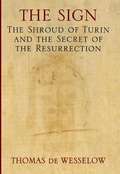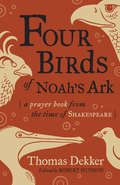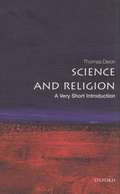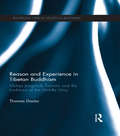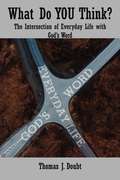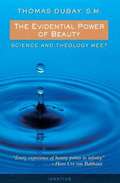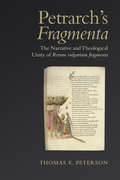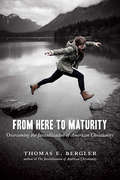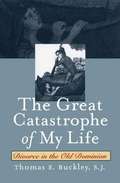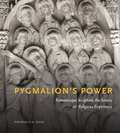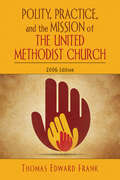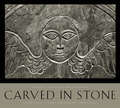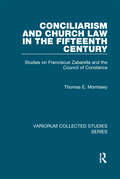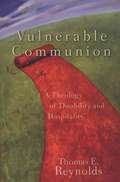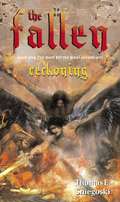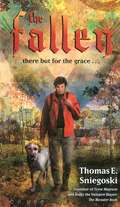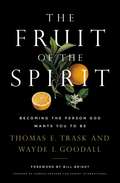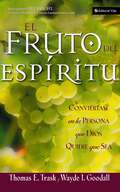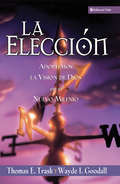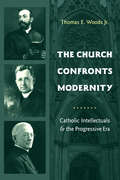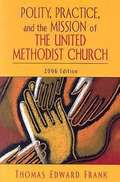- Table View
- List View
Religion and the Making of Modern East Asia
by Thomas David DuboisReligious ideas and actors have shaped Asian cultural practices for millennia and have played a decisive role in charting the course of its history. In this engaging and informative book, Thomas David DuBois sets out to explain how religion has influenced the political, social, and economic transformation of Asia from the fourteenth century to the present. Crossing a broad terrain from Tokyo to Tibet, the book highlights long-term trends and key moments, such as the expulsion of Catholic missionaries from Japan, or the Taiping Rebellion in China, when religion dramatically transformed the political fate of a nation. Contemporary chapters reflect on the wartime deification of the Japanese emperor, Marxism as religion, the persecution of the Dalai Lama, and the fate of Asian religion in a globalized world.
The Sign: The Shroud of Turin and the Secret of the Resurrection
by Thomas De WesselowThe Shroud of Turin, widely thought to be a fake, is in fact authentic. The greatest mystery in history is finally solved, in Thomas de Wesselow's The Sign. The birth of Christianity, nearly 2000 years ago, has shaped the whole course of human history. Yet historians still cannot explain how it all really began. What made Jesus's followers claim to have seen him alive again, three days after his crucifixion? Why did Christianity take off so quickly?It is one of the biggest and most profound of all historical mysteries. This extraordinary book, based on seven years of secret research by a brilliant historian, finally provides the answer. And it lies an enigmatic relic long assumed to be a fake: the Shroud of Turin. With historical detective work and cutting-edge scientific research, art historian Thomas de Wesselow has discovered that Jesus's followers did see something at the tomb. They saw something real but out of the ordinary - something that seemed like a miracle. It was the burial cloth of Jesus, stained with his body image. This ancient marvel was hailed as a sign of the Resurrection, and kick-started the Christian faith. The Sign details conclusive evidence that the Shroud of Turin is authentic, showing that the faint image on the cloth was formed naturally through a rare chemical reaction. It then explains how this revelation solves multiple puzzles of religious history: for example, the Gospel reports of the appearances of the Risen Christ are clearly based on early viewings of the Shroud. As well as a major historical breakthrough, The Sign is a truly thrilling read - and one you will never forget. 'Overturning 2,000 years of received biblical wisdom is no small matter. Consequently [this] book encompasses an impressive amount of scholarship and scientific examination. Persuasive. . . a very intriguing explanation' Michael Prodger, Mail on Sunday 'Fascinating. . . startling' Telegraph ' A fresh insight into the Easter story' Financial Times 'Thorough, well-researched and fair-minded. . . Persuasive. . . much more than just an addition to the canon of Shroud literature' Irish Times Thomas de Wesselow earned his MA and PhD at London's Courtauld Institute, researching the controversial Guidoriccio fresco in Siena, before becoming a Scholar at the British School in Rome where he worked on another of the great mysteries of Italian art history, the Assisi Problem. After a year in the curatorial department at the National Gallery in London, he was appointed a Post-Doctoral Research Associate at King's College, Cambridge, where he was later awarded a Leverhulme Early Career Fellowship. He has written on a number of famous Renaissance pictures whose meanings have hitherto defied analysis, including Botticelli's Primavera and Titian's Sacred and Profane Love. He has also developed new ideas about medieval world-maps, in particular the Hereford Mappamundi. Since 2007 he has been researching this book full-time. He is 40 years old and he lives in Cambridge.
Four Birds of Noah's Ark: A Prayer Book from the Time of Shakespeare
by Thomas DekkerA timeless, little-known literary classic to engage a new generation of readers As the Black Death ravaged London in 1608, in the midst of societal chaos and tragedy, playwright Thomas Dekker wrote Four Birds of Noah&’s Ark, a book containing fifty-six prayers for the people of London and all of England. The prayers in this book bear witness to Dekker&’s deep faith with a power and poignancy that few written prayers in English literature achieve. Bringing Dekker&’s devotional classic back into print for the first time since 1924, editor Robert Hudson has annotated the prayers and modernized their language without sacrificing their enchanting beauty and simplicity. Hudson&’s substantive and illuminating introduction is a gem in itself.
Four Birds of Noah's Ark: A Prayer Book from the Time of Shakespeare
by Thomas DekkerA timeless, little-known literary classic to engage a new generation of readers As the Black Death ravaged London in 1608, in the midst of societal chaos and tragedy, playwright Thomas Dekker wrote Four Birds of Noah&’s Ark, a book containing fifty-six prayers for the people of London and all of England. The prayers in this book bear witness to Dekker&’s deep faith with a power and poignancy that few written prayers in English literature achieve. Bringing Dekker&’s devotional classic back into print for the first time since 1924, editor Robert Hudson has annotated the prayers and modernized their language without sacrificing their enchanting beauty and simplicity. Hudson&’s substantive and illuminating introduction is a gem in itself.
Science and Religion: A Very Short Introduction
by Thomas DixonThe debate between science and religion is never out of the news: emotions run high, fueled by polemical bestsellers like The God Delusion and, at the other end of the spectrum, high-profile campaigns to teach "Intelligent Design" in schools. Yet there is much more to the debate than the clash of these extremes. As Thomas Dixon shows in this balanced and thought-provoking introduction, a whole range of views, subtle arguments, and fascinating perspectives can be found on this complex and centuries-old subject. He explores the key philosophical questions that underlie the debate, but also highlights the social, political, and ethical contexts that have made the tensions between science and religion such a fraught and interesting topic in the modern world. Dixon emphasizes how the modern conflict between evolution and creationism is quintessentially an American phenomenon, arising from the culture and history of the United States, as exemplified through the ongoing debates about how to interpret the First-Amendment's separation of church and state. Along the way, he examines landmark historical episodes such as the Galileo affair, Charles Darwin's own religious and scientific odyssey, the Scopes "Monkey Trial" in Tennessee in 1925, and the Dover Area School Board case of 2005, and includes perspectives from non-Christian religions and examples from across the physical, biological, and social sciences.
Reason and Experience in Tibetan Buddhism: Mabja Jangchub Tsöndrü and the Traditions of the Middle Way (Routledge Critical Studies in Buddhism)
by Thomas DoctorBased on newly discovered texts, this book explores the barely known but tremendously influential thought of the Tibetan Buddhist teacher, Mabja Jangchub Tsöndrü (d. 1185).This Tibetan Buddhist master exercised significant influence on the interpretation of Madhyamaka thinking in Tibet during the formative phase of Tibetan Buddhism and plays a key role in the religious thought of his day and beyond. The book studies the framework of Mabja’s philosophical project, holding it up against the works of both his own Madhyamaka teachers as well as those of central authors of the later "classical period". The emerging account of the evolution of Madhyamaka in Tibet reveals a striking pattern of transformative appropriations. This, in turn, affords us insights into the nature and function of tradition in Tibetan religious culture and Mahāyāna Buddhism at large. Innovation is demanded for both the advancement and consolidation of tradition. This ground-breaking book is an invaluable contribution to the study of Tibetan philosophy. It is of great interest to Buddhist practitioners, specialists in Buddhist philosophy and Tibetan Buddhism.
What Do You Think?: The Intersection of Everyday Life with God’s Word
by Thomas DoubtWhat Do YOU Think? is a book by Thomas J. Doubt to stimulate thinking about aspects of everyday life that may not be on our front burners. Many people board a commercial airline each day; few, if any, might reflect on how the safety briefing might be used to tell someone about Jesus. A morning cup of coffee often allows us to ponder how our day might go, but does it draw our attention to warnings in the Bible? Riding a golf cart to the first tee probably does not inspire thoughts about our journey of faith.Jesus began several of his teaching moments by asking a simple question. What do you think? His intent was not to solicit personal opinions. The world is neck deep in personal opinions lacking a divine foundation. From the beginning, the Word that became flesh and dwelt among us wanted our brains to be engaged by his words so our thoughts might travel from mind to heart, and from heart to action. What Do YOU Think? is a book that follows the model of Jesus. Stories to stimulate thinking, scriptures to encourage the heart, and in the end, conviction to choose a better path.
The Evidential Power of Beauty
by Thomas DubayWhile everyone is delighted by beauty, and the more alive among us are positively fascinated by it, few are explicitly aware that we can recognize truth by its beauty and simplicity. Dubay explores the reasons why all of the most eminent physicists of the twentieth century agree that beauty is the primary standard for scientific truth. Likewise, the best of contemporary theologians are also exploring with renewed vigor the aesthetic dimensions of divine revelation. Honest searchers after truth can hardly fail to be impressed that these two disciplines, science and theology, so different in methods, approaches and aims, are yet meeting in this and other surprising and gratifying ways. This book relates these developments to nature, music, academe and our unquenchable human thirst for unending beauty, truth and ecstasy, a thirst quenched only at the summit of contemplative prayer here below, and in the consummation of the beatific vision hereafter.
Petrarch's 'Fragmenta': The Narrative and Theological Unity of 'Rerum vulgarium fragmenta'
by Thomas E PetersonPetrarch's Rerum vulgarium fragmenta, a collection of lyric poems on sacred and profane love and other subjects, has traditionally been viewed as reflecting the conflicted nature of its author. However, award winning author Thomas E. Peterson argues that Petrarch's Fragmenta is an ordered and coherent work unified by narrative and theological structures.By concentrating on the poem's reliance on Christian tenets and distinguishing between author, narrator and character, Peterson exposes the underlying narrative and theological unity of the work. Building on recent Petrarch scholarship and broader studies of medieval poetics, poetic narrativity, and biblical intertextuality, Peterson conducts a rigorous examination of the Fragmenta's poetic language. This combination of stylistic and philological analysis recasts Petrarch's poetry in a new light revealing its radically innovative and liberating character.
From Here to Maturity: Overcoming the Juvenilization of American Christianity
by Thomas E. BerglerExpert guidance on how to grow up in Christ This book is a follow-up to Thomas Bergler’s acclaimed work The Juvenilization of American Christianity, which documents how church youth ministries over the past several decades have contributed to a process of adolescent spiritual traits becoming accepted and even celebrated by Christians of all ages. This “juvenilization” in the church is a real problem that must be addressed, says Bergler, and in his new book he addresses it head-on. Bergler’s From Here to Maturity is an accessible guide for helping both individuals and whole faith communities to grow spiritually. Bergler claims that spiritual maturity -- defined as “basic competence in the Christian life” -- is both desirable and attainable, and he effectively presents a biblical theology of spiritual maturity, identifying its traits from pertinent New Testament passages. Adapting Dallas Willard’s model of spiritual formation and applying it to congregational life, Bergler offers a wealth of practical, research-based guidance as to how Christian leaders can effectively foster spiritual maturity in their congregations. He also identifies six key faith-sustaining factors and provides a system for evaluating a church’s state of spiritual maturity and steps for improving it. Ecumenically friendly, From Here to Maturity will be useful to individuals and leaders from many different churches and theological traditions.
The Great Catastrophe of My Life
by Thomas E. BuckleyFrom the end of the Revolution until 1851, the Virginia legislature granted most divorces in the state. It granted divorces rarely, however, turning down two-thirds of those who petitioned for them. Men and women who sought release from unhappy marriages faced a harsh legal system buttressed by the political, religious, and communal cultures of southern life. Through the lens of this hostile environment, Thomas Buckley explores with sympathy the lives and legal struggles of those who challenged it.Based on research in almost 500 divorce files, The Great Catastrophe of My Life involves a wide cross-section of Virginians. Their stories expose southern attitudes and practices involving a spectrum of issues from marriage and family life to gender relations, interracial sex, adultery, desertion, and domestic violence. Although the oppressive legal regime these husbands and wives battled has passed away, the emotions behind their efforts to dissolve the bonds of marriage still resonate strongly.
Pygmalion’s Power: Romanesque Sculpture, the Senses, and Religious Experience
by Thomas E. DalePushed to the height of its illusionistic powers during the first centuries of the Roman Empire, sculpture was largely abandoned with the ascendancy of Christianity, as the apparent animation of the material image and practices associated with sculpture were considered both superstitious and idolatrous. In Pygmalion’s Power, Thomas E. A. Dale argues that the reintroduction of architectural sculpture after a hiatus of some seven hundred years arose with the particular goal of engaging the senses in a Christian religious experience. Since the term "Romanesque" was coined in the nineteenth century, the reintroduction of stone sculpture around the mid-eleventh century has been explained as a revivalist phenomenon, one predicated on the desire to claim the authority of ancient Rome. In this study, Dale proposes an alternative theory. Covering a broad range of sculpture types—including autonomous cult statuary in wood and metal, funerary sculpture, architectural sculpture, and portraiture—Dale shows how the revitalized art form was part of a broader shift in emphasis toward spiritual embodiment and affective piety during the late eleventh and twelfth centuries.Adding fresh insight to scholarship on the Romanesque, Pygmalion’s Power borrows from trends in cultural anthropology to demonstrate the power and potential of these sculptures to produce emotional effects that made them an important sensory part of the religious culture of the era.
Pygmalion’s Power: Romanesque Sculpture, the Senses, and Religious Experience
by Thomas E. DalePushed to the height of its illusionistic powers during the first centuries of the Roman Empire, sculpture was largely abandoned with the ascendancy of Christianity, as the apparent animation of the material image and practices associated with sculpture were considered both superstitious and idolatrous. In Pygmalion’s Power, Thomas E. A. Dale argues that the reintroduction of architectural sculpture after a hiatus of some seven hundred years arose with the particular goal of engaging the senses in a Christian religious experience. Since the term “Romanesque” was coined in the nineteenth century, the reintroduction of stone sculpture around the mid-eleventh century has been explained as a revivalist phenomenon, one predicated on the desire to claim the authority of ancient Rome. In this study, Dale proposes an alternative theory. Covering a broad range of sculpture types—including autonomous cult statuary in wood and metal, funerary sculpture, architectural sculpture, and portraiture—Dale shows how the revitalized art form was part of a broader shift in emphasis toward spiritual embodiment and affective piety during the late eleventh and twelfth centuries.Adding fresh insight to scholarship on the Romanesque, Pygmalion’s Power borrows from trends in cultural anthropology to demonstrate the power and potential of these sculptures to produce emotional effects that made them an important sensory part of the religious culture of the era.
Polity, Practice, and the Mission of The United Methodist Church: 2006 Edition
by Thomas E. Frank"Commissioned by the General Board of Higher Education and Ministry for use in United Methodist doctrine/polity/history courses." This in-depth analysis of the connection between United Methodist polity and theology addresses ways in which historical developments have shaped--and continue to shape--the organization of the church.This revised edition incorporates the actions of The United Methodist General Conference, 2004. The book discusses continuing reforms of the church's plan for baptism and church membership, as well as the emergence of deacon's orders and other changes to ordained ministry procedures. The text is now cross-referenced to the Book of Discipline, 2004, including the revised order of disciplinary chapters and paragraph numbering. Denominational statistics are updated, along with references to recent works on The United Methodist Church and American religious life.
Carved in Stone: The Artistry of Early New England Gravestones
by William Gilson Thomas E. GibsonEvocative photographs and essay illuminate early American gravestones Gravestones are colonial America's earliest sculpture and they provide a unique physical link to the European people who settled here. Carved in Stone book is an elegant collection of over eighty fine duotone photographs, each a personal meditation on an old stone carving, and on New England's past, where these stones tell stories about death at sea, epidemics such as small pox, the loss of children, and a grim view of the afterlife. The essay is a graceful narrative that explores a long personal involvement with the stones and their placement in New England landscape, and attempts to trace the curious and imperfectly documented story of carvers. Brief quotes from early New England writers accompany the images, and captions provide basic information about each stone. These meditative portraits present an intimate view of figures from New England graveyards and will be enjoyed by anyone with an interest in early Americana and fine art photography.
Conciliarism and Church Law in the Fifteenth Century: Studies on Franciscus Zabarella and the Council of Constance (Variorum Collected Studies)
by Thomas E. MorrisseyCrises are never the best of times and the era of the Great Western Schism (1378-1417) easily qualifies as one of the worst of times. As a professor of canon law at the University of Padua and later cardinal, and as a major theorist in the conciliarist movement, Franciscus Zabarella (1360-1417) tried to do what a good legal mind does: find and explicate a viable and legal solution to the crises of his time, a solution that would stand up in his own era and for the generations that followed. In this volume Thomas Morrissey looks at what he said, wrote and did, and places him and his thought in the context of the late medieval and early modern era, how he reflected that world and how he influenced it. Particular studies elucidate what he wrote on the authority and on the duty of the people in power, what they could do and should do, as well as what they should not do. They also show how he explored the area of early constitution law and human rights in civil and religious society and that his work leads down the road to our modern constitutional democratic societies. The volume includes two previously unpublished studies, on the situation in Padua c. 1400 and on a sermon from 1407, together with an introduction contextualizing the articles.
Vulnerable Communion: A Theology of Disability and Hospitality
by Thomas E. ReynoldsAs parents of a son with disabilities, Thomas E. Reynolds and his wife know what it's like to be misunderstood by a church community. In Vulnerable Communion, Reynolds draws upon that personal experience and a diverse body of literature to empower churches and individuals to foster deeper hospitality toward persons with disabilities. Reynolds argues that the Christian story is one of strength coming from weakness, of wholeness emerging from brokenness, and of power in vulnerability. He offers valuable biblical, theological, and pastoral tools to understand and welcome those with disabilities. Vulnerable Communion will be a useful resource for any student, theologian, church leader, or lay person seeking to discover the power of God revealed through weakness.
Reckoning
by Thomas E. SniegoskiThe time has come for Aaron Corbet, the eighteen-year-old son of an angel and a mortal, to face his worst enemy. Verchiel, the fallen leader of the Powers, is determined to defeat the prophecy that foretold Aaron's power over all the Fallen. And to do this, he intends to kill Aaron, hoping that the removal of such a "blight" will restore Verchiel in the eyes of the Creator. Aaron has been training for this showdown, working to understand and control the awesome force that resides deep within himself. He knows he will win. After all, Verchiel has taken away everything and everyone who ever meant anything to Aaron. He has nothing to lose...until Verchiel introduces Aaron to his long-lost father.
The Fallen
by Thomas E. SniegoskiAaron Corbet isn't a bad kid -- he's just a little different. archangel On the eve of his eighteenth birthday, Aaron dreams of a darkly violent landscape. He can hear the sounds of weapons clanging, the screams of the stricken, and another sound he cannot quite decipher. But gazing upward at the sky, he suddenly understands. It is the sound of great wings, angels' wings, beating the air unmercifully as hundreds of armored warriors descend on the battlefield. Orphaned since birth, Aaron is suddenly discovering newfound -- and sometimes supernatural -- talents. But not until he is approached by two men does he learn the truth about his own destiny, and his role as a liaison between angels, mortals, and Powers both good and evil, some of whom are hell-bent on his own destruction....
The Fallen 1
by Thomas E. SniegoskiAaron Corbet isn't a bad kid--he's just a little different. And starting on the eve of his eighteenth birthday, Aaron begins to discover supernatural talents. Then he learns the truth about his destiny: He must unite angels, mortals, and Powers both good and evil, some of whom are hell-bent on his destruction.... The Fallen quartet, now published for the first time in two action-packed bind-ups, chronicles an epic struggle, where the fate of the world rests on the outcome of one teen's monumental quest. The Fallen 1
The Fruit of the Spirit: Becoming The Person God Wants You To Be
by Thomas E. Trask Wayde I. GoodallNothing Beats the Taste of Fresh FruitWould you like true fulfillment in your life? Health in your relationships? Victory over anxiety and conflict? You can have them—if you let God’s Spirit grow His fruit in your heart.In The Fruit of the Spirit Tom Trask and Wayde Goodall take you for a close look at love, joy, peace, patience, kindness, and the rest of the fruit of the Spirit. Here is a passionate and illuminating look at what happens to your thoughts, emotions, and actions when you live each day in intimate relationship with Jesus Christ. Drawing from the storehouse of God’s Word, Trask and Goodall sow seeds of insight into your heart that both convict and encourage. They show how you can cooperate with God’s work in your life. They offer true-life examples of the difference you, too, can make when you let the Holy Spirit reproduce the character of Jesus within you.Your witness for Christ is as good as the fruit your relationship with Him produces. The Fruit of the Spirit points you toward a lifestyle that makes the gospel you proclaim attractive to others because they can see its results.
The fruto del Espíritu: Conviértase en la persona que Dios quiere que sea
by Thomas E. Trask Wayde I. Goodall¿Desea una vida llena de satisfacción? ¿Relaciones saludables? ¿Victoria sobre el conflicto y la ansiedad? Puede tenerlos si deja que el Espíritu de Dios desarrolle su fruto en su corazón. En este libro Tom Trask y Wayde Goodall le harán examinar el amor, la alegría, la paciencia, la amabilidad y el resto del Fruto del Espíritu. Esto es un vistazo a lo que sucede con nuestros pensamientos, emociones y acciones cuando vivimos cada día en relación íntima con Jesucristo. Extrayendo del almacén de la palabra de Dios, Trask y Goodall plantan semillas en nuestros corazones que condenan y, a la vez, alientan. Muestran como uno puede cooperar con la obra de Dios en nuestra vida. Asimismo, dan ejemplos de como nos podemos distinguir cuando deja que el Espíritu de Dios reproduzca la persona de Jesucristo en nuestra vida. Nuestro testigo por Cristo es tan bueno como el fruto que produce nuestra relación con él. Este libro cambiara su estilo de vida actual por uno donde el evangelio que proclama atraerá a otros al ver los resultados.
elección
by Thomas E. Trask Wayde I. GoodallCon urgencia y candor, este libro nos señala la increíble oportunidad que tenemos al alcance hoy en día. Nunca antes han habido tan tremendas oportunidades evangelísticas. Satanás nunca ha trabajado tanto para distraer a la gente lejos del Evangelio. Y como nunca antes, hoy es el tiempo en el que todo cristiano lleve a cabo su muy particular papel al llevar a cabo la Gran Comisión.
The Church Confronts Modernity: Catholic Intellectuals and the Progressive Era
by Thomas E. Woods Jr.At the beginning of the twentieth century, American intellectuals grew increasingly sympathetic to Pragmatism and empirical methods in the social sciences, which challenged the dogma and "absolute truth" of the church. Defenders of the faith opposed this new public philosophy, instead insisting on the uniqueness of the Catholic Church and a sound philosophy of humanity. Neither capitulating to the new creed nor retreating into self-righteous isolation, they formed an economic and political philosophy based on natural law, appropriated what good they could find in progressivism, and encouraged Americans to embrace Catholicism. Thomas E. Woods's provocative study shows how American Catholics attempted to retain their identity in an age of pluralism and laid the groundwork for a half-century of intellectual vitality.
Polity, Practice, and the Mission of the United Methodist Church 2006
by Thomas Edward Frank"Commissioned by the General Board of Higher Education and Ministry for use in United Methodist doctrine/polity/history courses. " This in-depth analysis of the connection between United Methodist polity and theology addresses ways in which historical developments have shaped--and continue to shape--the organization of the church. This revised edition incorporates the actions of The United Methodist General Conference, 2004. The book discusses continuing reforms of the church's plan for baptism and church membership, as well as the emergence of deacon's orders and other changes to ordained ministry procedures. The text is now cross-referenced to the Book of Discipline, 2004, including the revised order of disciplinary chapters and paragraph numbering. Denominational statistics are updated, along with references to recent works on The United Methodist Church and American religious life.

